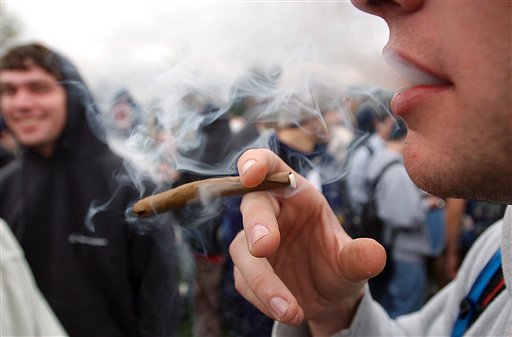The number of Coloradans ages 18-20 who have been granted medical marijuana licenses has increased every year for the last four and appears on track to increase again in 2013, according to data released by the Colorado Department of Public Health and the Environment.
And of the 18-20-year olds with medical marijuana licenses in Colorado, more than 72 percent list ill-defined “severe pain” as their only medical condition for needing to use the drug, according to state data.
The data underscore Colorado’s profound difficulties with regulating the substance. Recreational marijuana use — legalized by state voters in November 2012 — is permitted for people 21 and older. However, Colorado also allows 18-year-olds to get a medical marijuana license without parental consent. Children under 18 may obtain a medical marijuana license with the signature of a consenting parent or legal guardian.
As many current medical marijuana dispensaries prepare to convert fully to retail shops in January 2014, or to expand their medical operations with sections for recreational buyers, it appears more 18-to-20-year-olds are willing to declare chronic illness to ensure they continue to have front-door entry. Many marijuana establishments will sell recreational and medical marijuana and supplies from the same buildings.
Among the state’s data about 18-20-year-old marijuana license holders (see the full response here):
- In December 2009 — the start of the boom of dispensaries in Colorado — there were 1,802 medical marijuana license holders ages 18-20. In December 2012, there were 4,021 license holders in that age range — a nearly 45 percent increase when comparing these two months.
- In May 2013, there were 4,528 medical marijuana license holders ages 18-20 — suggesting that the state is on track to see yet another increase in December 2013.
- Medical marijuana holders ages 18-20 overwhelmingly are male — which is also consistent with drug-abuse and/or addiction profiles. In May 2013, a little more than 78 percent of these license holders were male, and almost 22 percent were female.
The state released these data in response to a public-information request filed July 30, 2013, on behalf of Smart Colorado, a nonprofit group billing itself as a watchdog to ensure the public’s interests come before the marijuana industry’s.
We would like statistics for the following categories from the Colorado Department of Public Health and the Environment, Medical Marijuana Division, concerning medical marijuana registrations in December 2009, December 2010, December 2011, December 2012 and May 2013. We would like to know:
- The numbers of registry patients ages 18, 19 and 20
- The percentages of all registry patients who are ages 18, 19 and 20
- The percentages of registered patients ages 18-20, broken down by gender
- The percentages of registered patients ages 18-20 who report the qualifying condition of “severe pain,” and the percentages of these young people who report “severe pain” as their only condition.



If you look at the total registrants numbers, those actually decreased from 12/2012 to 05/13 with the percentage of males 18-20 going down.
I will concede that I do not believe all these young people have severe pain issues, at least I hope not. However, you must concede that some of these claims are legitimate.
You stated “Colorado also allows 18-year-olds to get a medical marijuana license without parental consent. Children under 18 may obtain a medical marijuana license with the signature of a consenting parent or legal guardian.” Well that is the law, and it is being followed.
You also stated “Many marijuana establishments will sell recreational and medical marijuana and supplies from the same buildings.” I agree that a certain percentage will indeed take advantage of the increased capital possibilities, however I also believe that many that have opened to truly help that patients will stay as medical dispensaries only.
Respectfully yours,
Dana M. Arvidson
Thanks so much for your message. We are, indeed, focused on 18 to 20 year olds.
I’ll take it from the top:
1. It’s important to recognize that these numbers are snapshots of one month in a year. While enlightening, they don’t tell us about registrant activity over an entire calendar year.
2. As for the legitimacy of anyone’s claim to need to use marijuana for any reason:
a. Though there is much reason to research the ingredients of the cannabis plant — and that’s research we should advocate — there is no appropriate medical application for marijuana at this time.
b. The evidence does not by any means demonstrate clear benefit in the absence of associated risk that marijuana use is advantageous over alternative measures. However, the literature does make painfully clear that marijuana use before the age of brain maturity (approximately age 25) can cause permanent harm.
c. The United States Food and Drug Administration determines what is and isn’t “medicine” in this country.
3. Is the law being followed? We can’t say for sure. Dr. Thurstone is well aware of young people who have forged their parents’ signatures to get pot licenses.
4. Dispensaries that don’t convert to retail shops will still be operating outside the bounds of federal law and widely accepted medical practice. It appears legal skirmishes are on the rise with physicians who erroneously “recommended” marijuana use. Turns out they’re settling for big bucks because their recommendations have gone against the broad medical community’s position that any recommendation for marijuana by a physician flies in the face of decades of research showing high risk and little benefit — and where those recommendations resulted in entirely predictable negative outcomes consistent with high-volume, repetitive cannabis use. So, here’s to hoping dispensary owners make note of that, too.